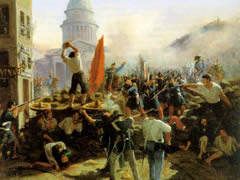FRENCH LANGUAGE HISTORY
 French Language, this language is spoken today by a vast Francophone population, the history of the French language begins with the colonisation of Gaul by the Romans. The Celts who inhabited Gaul when the Romans came were Indo-Europeans, related to the Greeks, Romans and Germanic peoples in both culture and language. Keep reading to learn more.
French Language, this language is spoken today by a vast Francophone population, the history of the French language begins with the colonisation of Gaul by the Romans. The Celts who inhabited Gaul when the Romans came were Indo-Europeans, related to the Greeks, Romans and Germanic peoples in both culture and language. Keep reading to learn more.
French Language
French is used as the official language of 22 countries and is the co-official language of several others, including Belgium, Canada, Haiti, Madagascar, and Switzerland. It is spoken as a first language by 51 million people in France and Corsica; in Canada by 7.2 million; in Belgium by 3.3 million; in Switzerland by 1.2 million; in Monaco by 17,000; in Italy by 100,000; and in the United States by nearly 2 million (primarily in Maine and Louisiana).In sub-Saharan Africa, some 5 million people (in Benin, Burkina Faso, Cameroon, Central African Republic, Chad, Congo, Côte dIvoire, Djibouti, Guinea, Madagascar, Mali, Niger, Rwanda, Senegal, Togo, and Zaire) use French as their principal international language, as do additional millions in Indochina (Vietnam, Laos, Cambodia). In addition, French continues to be spoken as a second language by many people in countries located along the southern and eastern rim of the Mediterranean that were once French colonies or territories (notably Algeria. Morocco, and Lebanon).
The History of the French language.
The prehistory of the French language begins with the colonisation of Gaul by the Romans. The Celts who inhabited Gaul when the Romans came were Indo-Europeans, related to the Greeks, Romans and Germanic peoples in both culture and language.They appear to have lived originally in central or eastern Europe, but began to move westwards around 500 B.C and settled in Gaul some two hundred years later, displacing the other peoples whom they found there, notably the Iberians, who were driven towards the south-east. By this time there were also important Greek settlements on the Mediterranean coast at such places as Marseilles, Nice and Antibes, which have preserved their Greek names. In the second century B.C these Greek settlers, harassed by the Gauls, asked for Roman campaign in Gaul, a campaign which, spread over thirty years from 154 to 125 B.C,. led to the conquest of what the Romans then called the Provincia or province, a name which survives today as Provence. At first the Roman colony extend from the Alps to the Rhone, to the eastern Pyrenees, taking in what is today Roussillon. In 57 B.C., Julius Caesar undertook the conquest of the rest of Gaul, a process which was virtually complete by 52 B.C., for the Gauls, essentially a loose confederation of tribes, lacked political unity.
In Gallo Roman France, a split occurred between north and south, assisted by incursions of Germanic speaking Franks whence the name "France" into the north. Here, too, further dialectalization occurred throughout the Middle Ages, resulting in a multitude of speech forms such as Francien, Picard, Norman, Lorrain, and Walloon. Southern French, or Provençal, split into Languedocien, Auvergnat, and many other dialects. The dialect of Paris gradually became the national language, however, because of the political prestige of the capital and today is accepted as the model for the French language.
Notable in phonology was the loss of opposition between Latin long and short vowels, the voicing of intervocalic voiceless consonants, and in some languages the loss of syllable- and word-final s. The emergence of accentual patterns led to the reduction or loss of many unstressed vowels in the more heavily accented languages such as Gallo-Roman and Old French, and to the diphthongization of some stressed vowels in most of the Romance languages. Only in French and Portuguese, however, did vowels before a nasal consonant undergo nasalization--compare French main, "hand," with Portuguese mao and Spanish and Italian mano.
© 2007-2023 - All Rights Reserved
